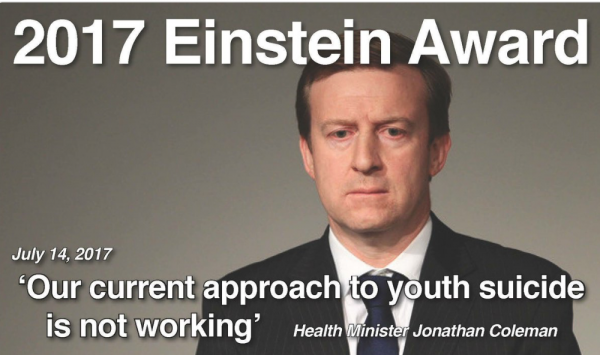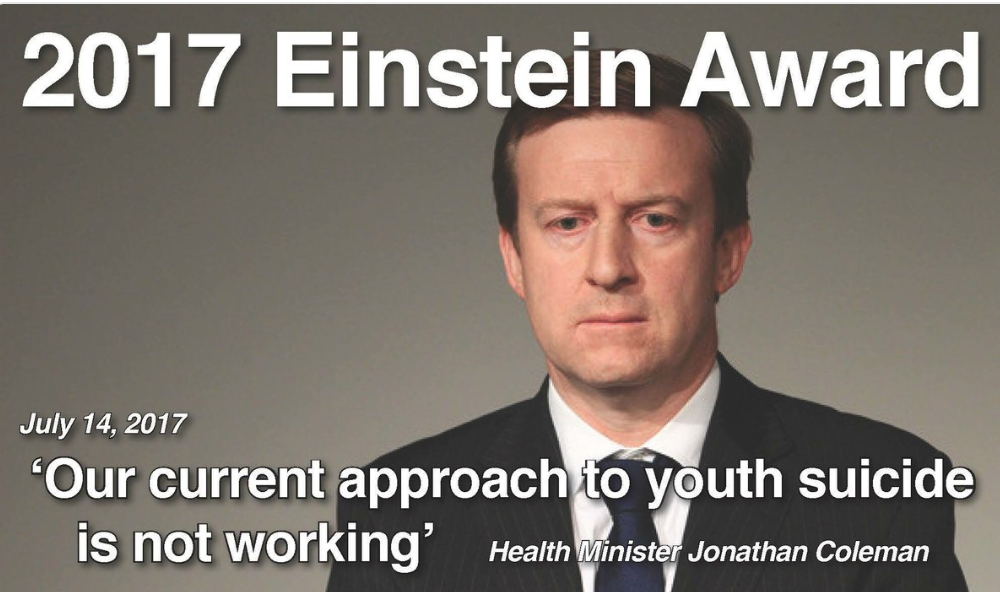
Despite strong feedback from the public, political parties are still mostly shying clear from campaigning on mental health and suicide issues in the election campaign.
Labour has had a successful public meeting in Christchurch on the subject, but haven’t responded to efforts to get them to run similar meetings in other centres; Mike King has told the NZ First conference “anyone who thinks mental health isn’t an election issue is stupid, naïve and shouldn’t be in the race”; the Greens have collectively got a little outraged when I publicly suggested action from them on mental health had been lacking, but I still haven’t seen it; and dear old useless Health Minister Jonathan Coleman has just discovered (13 July) after 9 years that National’s “current approach to youth suicide is not working”.
Beyond that, there is no sign that the parties in contention have really done any heavy lifting in this vital policy area, so I thought I’d give them a little help by listing what I think should be included:
- A comprehensive, independent review of current mental health services – not run by the sector, the Ministry or anyone with a stake in existing services
- A good strong look at the causes of the high incidence of suicide and mental health problems in New Zealand, particularly among Maori & Pacific Island groups, and among young people; including consideration of the effects of poverty, poor housing and unemployment
- Trained staff to provide mental health support in every school
- Restore mental health training as a compulsory element of GP training
- Provide residential respite care, with trained support staff, for patients transitioning from Hospital inpatient care to the community, and to avoid the need for some to use full hospital residential services
- Have a common-sense based risk analysis policy for mental health patients in hospital or community care that puts the safety of the patients first, followed by staff and community
- A requirement to include, listen to, and take on board family views and support when developing treatment plans for people with mental illness
- Consider the role of what is effectively a drugs-first treatment policy within the mental health sector. Drugs may have short-term positive outcomes for some people with mental illness, but rarely work in the long-term, and are never the ONLY answer to mental illness
- Ensure the national budget for mental health costs is set at level that enables treatment and support to be free for all who need it; and that it keeps pace with cost an needs changes on a bi-partisan basis.
- Provision of national and local leadership in the mental health sector that is not tied to the apron-strings of any Government: that admits mistakes and problems, and learns from them; and that doesn’t claim to have all the answers.
Of course, these won’t be the only elements of a good mental health policy, but in my opinion – if any of them are missing – then there will be gaps in that policy, that will need to be revisited in short order.
David Macpherson is TDB’s mental health blogger. He became involved in mental health rights after the mental health system allowed his son to die. He is now a Waikato DHB Member.






Wairarapa DHB PR expert has just taken over suicide prevention – the woman is an arrogant apologist for our National party led DHB.
Apparently these morons believe putting a 1 hour TV show on the Wairarapa channel 41 regarding suicide is going to fix people. Yip having an American show of people in a support group talking with each other is going to fix mental health here.
We don’t get support groups of course and we’re not as affluent as the people in the TV show. We don’t get to walk around retreats in the mountains saying how much better things are. WE GET NOTHING BUT ONGOING ABUSE – WHICH ESCALATES AGAINST DISABLED POOR COMING UP TO EVERY ELECTION FOR 30 YRS
Putting your resource into a TV show that won’t reach most of the people you need to reach seems like a monumental waste of scarce resources. However, it does probably ‘tick the box’ so the Govt can say there is action in the Wairarapa, event when Blind Freddy can see the reverse is true.
I think the most important question that is particularly avoided by almost all in the mental health and suicide conversation is WHY? Why does New Zealand have such high suicide rates? What do we do differently that other countries do? Does our society and government’s championing of precarious work, precarious accommodation and winner-take-all existence contribute to this? Are our communities cohesive or fragmented? Similar to obesogenic environments does the way we live and physically get around contribute to increasing social isolation and therefore contributing to negative mental health outcomes?
Is addressing these contributing social and environmental factors the fence at the top of the cliff? A fence that needs to be built to work in concert with the mental health services in the ambulance at the bottom.
Sounds correct Fred, except that very often the ambulances at the bottom of the cliff are sent away, and the hearses are brought in.
I fully agree with Fred. Both an ambulance or a hearse at the bottom is not acceptable – a strong fence at the top is vital, and yet no-one, including your great comments in the blog, are going there.
We need to actively strive for ways to STOP as many people as possible becoming mentally ill. THAT needs to be the main priority, with every suggested as secondary for those that find a way through any small holes in the fence.
It is clearly not an easy thing to do, but we must start changing attitudes everywhere, to stop people getting depressed, being anxious, and, as a community, fully support and understand those whose mental issues are more complex, like bi-polar, schizophrenia etc.
I am all for the ambulance at the bottom processes for those already there, but it is so frustrating when no-one wants to even consider the fence at the top… Please champion this Dave…
Two of the areas that definitely need changing, is bullying in schools, and the way businesses treat staff.
Any teacher or principle that says their school does not have bullying needs to be severely disciplined for ignorance that causes harm. Bullying exists in ALL schools, and kids get away with it, and grow up thinking it is OK to belittle another person. Calling it ‘kids being kids’ is disgraceful, and that applies to parents who don’t take complaints against their own kids seriously.
So many businesses treat their staff like shit, and many staff a bullies. THAT needs to be stopped, and the whole attitude of businesses treating staff like machines needs to cease. Workloads keep increasing, but in so many cases people are quite simply not able to fit more work into their days. And wages in many sectors are a disgrace. Retail is one, where wages have not increased in nearly 20 years (I speak from experience).
These social attitudes where it is the norm to treat people badly have got to be addressed. Personally I don’t care that it could be social engineering, but something needs to be done. To say it is too hard is just plain cowardly…
Why – how about the rugby-obsessed nature of NZ that leads to most boys being encouraged by parents and/or peer-pressured into playing, perhaps suffering head trauma in much the same way as American Footballers. Will Smith’s movie, Concussion, explores the development of suicidal tendencies in American Footballers, forwards who receive the worst collisions to the head tend to commit suicide at around 50 years old. Perhaps an enterprising medical or life sciences graduate could look into the causal connection between head trauma in young/teenage boys and brain damage leading to suicide. The parental and peer pressures should also be examined as these may also play a part.
I think that a more personal approach is needed. Prescription pharmaceuticals are over prescribed. In my view, the reliance on pharmaceuticals to treat observation diagnosed conditions is the totally wrong approach. This issue needs to be addressed, I haven’t heard anyone on TV speak out about this major problem. Creating a life long dependency on pharmaceuticals for anyone who thinks a bit differently is unacceptable.
It really gets to me when I keep hearing the question, why is this happening? Well, this is why, nobody is addressing the elephant in the room. The reasons for this lack of acknowledgement should be clear, and we should be worried about that.
I call bullshit James, this is one area where New Zealand fails miserably, kiwis do wonderfully at rugby, sailing, overpriced housing, domestic violence and running each other over with cars and trucks, but they do a shit job at addressing suicide hence why IT’S THE HIGHEST F**KIN RATE IN THE DEVELOPED WORLD. Where are your stats to back up the overprescription argument? Pharmaceuticals are one of many ways at addressing the symptoms of mental illness which is often a result of ENVIRONMENTAL CAUSES, such as the abovementioned homelessness, precarious work, social isolation, violence, bullying, etc. Fail to address the causes and voila you have the ingredients for a suicide bonanza. If overprescription was the cause then the Americans, British and many European nations who prescribe at higher rates would have higher rates of suicide, it seems those enlightened nations seem to understand the issue at hand, unlike harden-up-yea-na-dumbfuckistan here at the bottom of the pacific. But what would I know, I’m sure the rate will magically drop because we have some empty conversations about our feelings because some f**kin All Black tells us it’s all ok…problem solved…crisis averted…happy f**kin days
“Our current approach towards youth suicide is not working”
Yes that’s for sure and Mr Coleman have you visited one of your so-callled world class medical hospitals Emergency department lately?????
I did as I was in such pain I got 2 hours broken sleep last night and came in almost crawling as the pain wolking on my leg knee was so painful words cant express it.
And then the receptionist asked coldly, “and what do you want us to do for it????
That was just after midday after me & my Wife drove 80 kms to our nearest Emergency department so I could get some relief before the knee goes rotten!!!!
No sense of care at all, but when I looked around the room their were many before me.
3 hours later my name came up and a doctor said we cant do any surgery here or injections with Cortisone or any other treatment but he gave me a script for Codene, (a barbituate drug).
Many sick folks there were coughing up sputum and shivering in that cold atmosphere, so Mr Coleman, is this the “Brighter future you said we will get??????
I have now witnessed our former world class health system destroyed as the Kiwirail railway has, as they had sold our assets and is this just all we got was a third class medical system here now.
Pathetic Dr Colman. Nactional = gone by september.
Change can only happen if there are those that listen. Sadly Coleman listens to his own voice and no one else’s.
To think that Mike King has been kneecapped in speaking at a particular school, tells me that that the Government’s “dark arts” are in force.
As the previous contributor said…
”
Pathetic Dr Coleman. National = gone by September.”
Too busy snorting Coca Cola ?
Comments are closed.